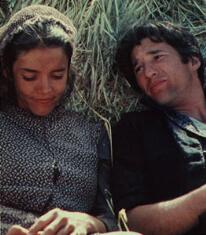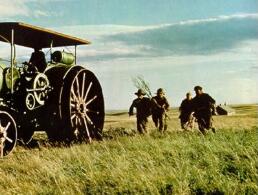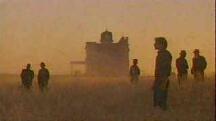Days of Heaven Revisited
by casey ward
 Ever since its inception, cinema has labored in the shadows of theatre and literature. Pressured into traditional forms of storytelling, filmmakers have rarely had faith in their own medium. The result of this being, of course, a sad lack of artistic pioneering. Granted, there have been a number of craftsman who, even while shackled by studio and narrative constraints, maintained singular visions. These artists are household names (Hitchcock, Welles, Lean, Kubrick, etc.), and for very good reason. Without their contributions, critics would have continued claiming cinema's inherent inferiority. Terrence Malick, lesser-known but no less important, is one such contributor. Malick, unlike the aforementioned directors, came to completely trust his artform. And then abandoned it for over 20 years.
Ever since its inception, cinema has labored in the shadows of theatre and literature. Pressured into traditional forms of storytelling, filmmakers have rarely had faith in their own medium. The result of this being, of course, a sad lack of artistic pioneering. Granted, there have been a number of craftsman who, even while shackled by studio and narrative constraints, maintained singular visions. These artists are household names (Hitchcock, Welles, Lean, Kubrick, etc.), and for very good reason. Without their contributions, critics would have continued claiming cinema's inherent inferiority. Terrence Malick, lesser-known but no less important, is one such contributor. Malick, unlike the aforementioned directors, came to completely trust his artform. And then abandoned it for over 20 years.
Days of Heaven, Malick's sophomore effort, begins with a montage of aged, tea-colored stills depicting scenes of WWI-era American life. Every stark photo could be mistaken for a Lewis Hine or Paul Strand print. The last, and most affecting, is a print of a grubby, pre-pubescent girl huddled on the curb, collar upturned, her two feet resting on wet cobblestones. There is a stiff, precocious resilience in the way her lips tighten and, were it not for her pleading eyes, we might think her lost to the harsh realities of urban poverty. This is Linda (Linda Manz), our narrator.
 At the beginning of the film, Bill (a surprisingly effective Richard Gere) works in a Chicago factory where, during a fistfight, he unintentionally kills his foreman. With his lover, Abby (Brooke Adams) and little sister Linda, he flees, via train, to Texas, where he quickly finds work on a wheat field. Overhearing a conversation between the farm's owner and his doctor, Bill discovers that the young farmer (Sam Shepard) is dying from an incurable disease. Seeing an opportunity to better his station, Bill convinces his girlfriend, whom he tells everyone is his sister, to succumb to the farmer's advances, which she finally agrees to. After the marriage, the farmer, who has harbored suspicions all along, catches Bill and Abby kissing a bit too tenderly, which results in Bill's departure. Abby, who gradually falls for the farmer, and Linda spend a blissful year together on the farm before Bill returns, bringing with him a plague of locusts.
At the beginning of the film, Bill (a surprisingly effective Richard Gere) works in a Chicago factory where, during a fistfight, he unintentionally kills his foreman. With his lover, Abby (Brooke Adams) and little sister Linda, he flees, via train, to Texas, where he quickly finds work on a wheat field. Overhearing a conversation between the farm's owner and his doctor, Bill discovers that the young farmer (Sam Shepard) is dying from an incurable disease. Seeing an opportunity to better his station, Bill convinces his girlfriend, whom he tells everyone is his sister, to succumb to the farmer's advances, which she finally agrees to. After the marriage, the farmer, who has harbored suspicions all along, catches Bill and Abby kissing a bit too tenderly, which results in Bill's departure. Abby, who gradually falls for the farmer, and Linda spend a blissful year together on the farm before Bill returns, bringing with him a plague of locusts.
The plot is not terribly original, but the style in which it is presented is almost always unique. Drifting in and out of the characters lives, the camera has a detachment from the adult proceedings much like the young narrator does. The audience is given only what dialogue is essential to understanding the characters' motivations. The narration is equally original, for Linda comments on seemingly insignificant things, and only peppers her colloquial voice-over with revealing insights. There is one heartbreaking moment when, travelling down an unnamed river in an unnamed part of the country after having experienced a tragedy most have the privilege of only reading about, Linda says: "You could see people on the shore, but it was far off and you couldn't see what they was doing. They were probably callin for help or something. Or they were trying to bury somebody or something."
 Days of Heaven is, quite simply, the most beautiful film ever made. Photographed by Oscar-winner Nestor Alemendros almost exclusively during the "magic hour" of the day (i.e. the moments of dawn and dusk where the sun, and therefore shadows, are not visible), the movie's images are appropriately ethereal. With its sparse dialogue, Days of Heaven is the closest we have come to "pure cinema." The cinematographer has given each of his shots a painterly attention. In fact, the vast, golden Texan landscape seems a painting given the breath of life. Never have I been so consistently awed while watching a film. Seeing this yesterday, for likely the tenth time, I was struck anew by how sumptuously and meticulously each frame was shot. Returning to Days of Heaven was like returning to a Rembrandt portrait, or a Shakespeare sonnet, one that we've seen and read innumerable times, but each time been unsettled. It is returning to an artist who has mastered his form.
Days of Heaven is, quite simply, the most beautiful film ever made. Photographed by Oscar-winner Nestor Alemendros almost exclusively during the "magic hour" of the day (i.e. the moments of dawn and dusk where the sun, and therefore shadows, are not visible), the movie's images are appropriately ethereal. With its sparse dialogue, Days of Heaven is the closest we have come to "pure cinema." The cinematographer has given each of his shots a painterly attention. In fact, the vast, golden Texan landscape seems a painting given the breath of life. Never have I been so consistently awed while watching a film. Seeing this yesterday, for likely the tenth time, I was struck anew by how sumptuously and meticulously each frame was shot. Returning to Days of Heaven was like returning to a Rembrandt portrait, or a Shakespeare sonnet, one that we've seen and read innumerable times, but each time been unsettled. It is returning to an artist who has mastered his form.
Copyright (c) 2005 erasing clouds |
|